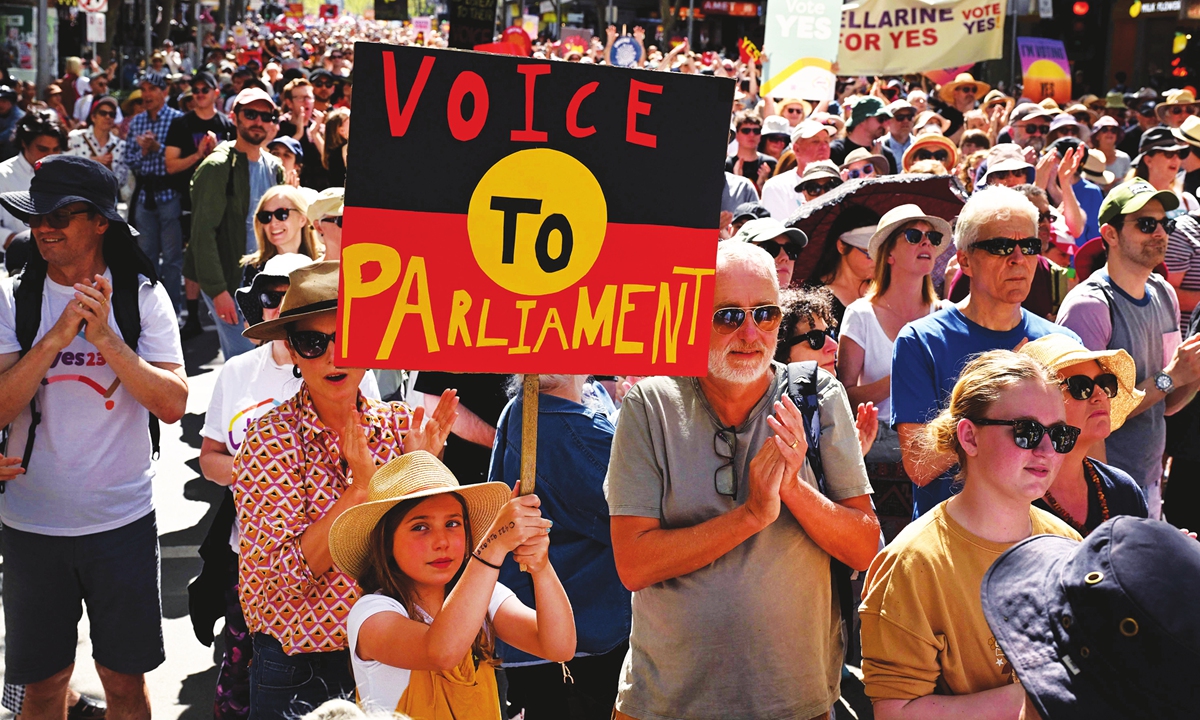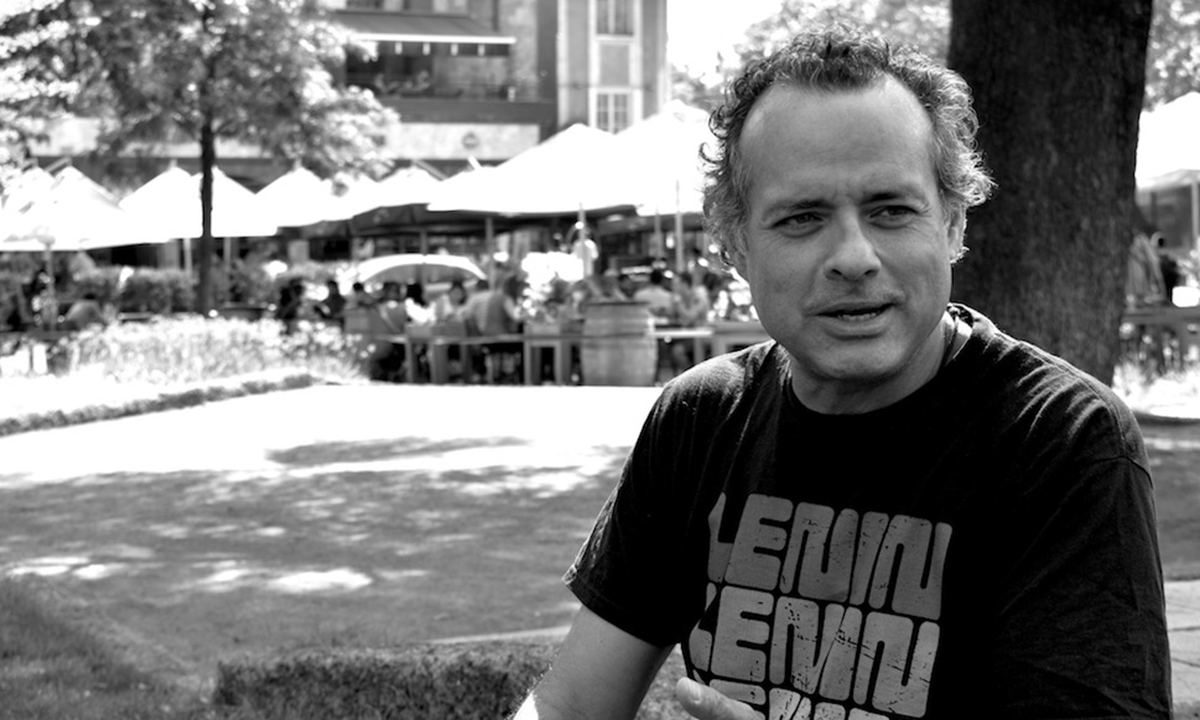
A girl holds up a placard of the Australian Aboriginal Flagduring a "Walk for Yes" rally in Melbourne on September 17, 2023. Photo: VCG
Editor's Note:Australia will vote in a historic referendum, the Voice, on Saturday that will decide the fate of its Aboriginal and Torres Strait Islander people, who have never been recognized as the country's first inhabitants in its constitution. If successful, they will be recognized and a body will be created to advise the government on issues that affect them. A No vote, however, would mean no change. In her I-Talk show, Global Times (GT) reporter Wang Wenwen talked to Jeanine Leane (Leane), a Wiradjuri writer, poet and academic from southwest New South Wales, Australia, on why the vote is important for the country's first inhabitants and why it is so difficult for political changes to happen in Australia.
GT: Why could the referendum be held this year?
Leane: We had a change of government last year. Quite a large advisory body comprising Aboriginal and Torres Strait Islander people put together the Uluru Statement from the Heart. It is about enshrining a voice into the constitution and asking for constitutional recognition which was rejected by the former government.
The new government promised to enact the Uluru Statement from the Heart again and bring back the idea of giving a voice to a referendum.
The government should listen. Various governments have had different opinions on this issue. But the government should listen to the representatives from the Indigenous community and have permanent Indigenous representation in parliament. But it is not just up to the government. It's up to the people. The government can't change the constitution without the people. There are some things the government can do, for example, there are issues to be addressed in the education system, particularly around the teaching of history.
GT: Why is the vote important?
Leane: Australia is the only settler colony where Aboriginal and Torres Strait Islander people, the country's first people, are not enshrined in the constitution. We are only 3 percent of the population. Due to past dangerous government policies, the population health and education levels are generally lower than could be expected. There are of course exceptions. But to enshrine a voice to recognize Aboriginal and Torres Strait Islander people in the constitution, and then to enshrine a voice which is an advisory body on health, education, housing and jobs for Aboriginal people would be one way of improving their standard of living.
Also, the nation needs to address the issue of truth telling. It's a settler colony like Aotearoa (New Zealand) or Canada or Tuvalu island, which are also former British colonies. However, Australia is unique in that it does not have the first people recognized in their constitution. So, Australia is internationally behind in that way.
There are various arguments in the No campaign. Some people think that it's going to be risky and that it will open up a whole lot of other issues, like compensation or the return of Aboriginal lands and the Torres Strait Island. But that is not what the Voice is about. The nature of conservative politics is to resist change.
Sometimes it can be really hard to change. Some of us are hoping that there are many settler Australians out there and well educated voters out there. We're also hoping that people read the facts rather than engaging in some of the misinformation that's around at this point on social media.
GT: Do you think this vote will truly change the political status of Indigenous people?
Leane: It depends if it's Yes or No, but either way it will change Australia and the way Australia is viewed internationally. I'm on the Yes side, I see this as a positive change, because there will then be an advisory body of Aboriginal and Torres Strait Islander people. There is a guaranteed place for Aboriginal and Torres Strait Islander people to speak about policies that impact Aboriginal and Torres Strait Islander people, not policies that necessarily impact the country as a whole. The Voice is not interested in that. It's interested in policies that can improve the lives of Aboriginal and Torres Strait Islander people. It will be permanently enshrined in the constitution and after that any government in the future will not be able to dissolve this advisory body, although the members of the advisory body will change over time.
But if it's No, then there won't be any constitutional recognition. In that way, Australia risks a further division among its own people, and also some international condemnation as well.
GT: Why does it take such a long time for Indigenous people to fight for their rights? Do you think colonialism plays a role?
Leane: The whole history of Australia is far too complex to go into in this interview, but Australia is a colony that was invaded for space. So the whole notion of settler claims does come into this. Colonialism does come into this. So does white supremacy. Australia had a white Australian policy for the first 73 years of its constitution. It banned all people, except the British or those of British heritage, and some other white groups. So Australia does have those historical issues looming over it. But the other thing to consider is Australia does have a large young voting population who may be thinking quite differently and more critically about the British empire and what colonialism has done, and the continuing legacies of colonialism.
GT: What dilemmas do Indigenous people face now?
Leane: For all Aboriginal and Torres Strait Islander people, not just myself, everyone is talking about the Yes campaign. There's a small minority that's being talked about by everyone. It is also stressful because many people expect Aboriginal and Torres Strait Islander people to be all the same. Different aspects of racism have come to the media, ranging from stereotypes to misunderstandings, to misinformation. This has affected the whole community. I think it has a lot to do with what the No campaign has done in terms of speaking against change. And perhaps it is a legacy of past cultural supremacy.
GT: What's your expectation for the result of the vote?
Leane: I can't say what my expectation is, because I think the polls are hard to gauge. I'm a Yes supporter, but it's proving hard to predict. I'm hoping that there are a lot of thoughtful and generous and quiet voters out there who are going to vote Yes on the day.
Many people are predicting the result to be quite close. As it's a referendum, a national majority and a majority in four states has to be achieved. If it doesn't achieve that, it's been unsuccessful even if the numbers are quite high. But if one is more in favor than the other, or if four states are more in favor of No, then it's defeated. It becomes fairly clear as the counting starts.
I'm hopeful about the result, but we just have to wait and see. If it is a No, it probably won't come back again in this way. It could be a long time before this opportunity comes around again, if ever. It is quite an important opportunity. It's not like an election where if this particular model proposal gets voted down, they get a chance to run on new platforms in three or four years. This is very much more once-in-a-generational opportunity to change the constitution, to have this recognition and to have a voice enshrined.

